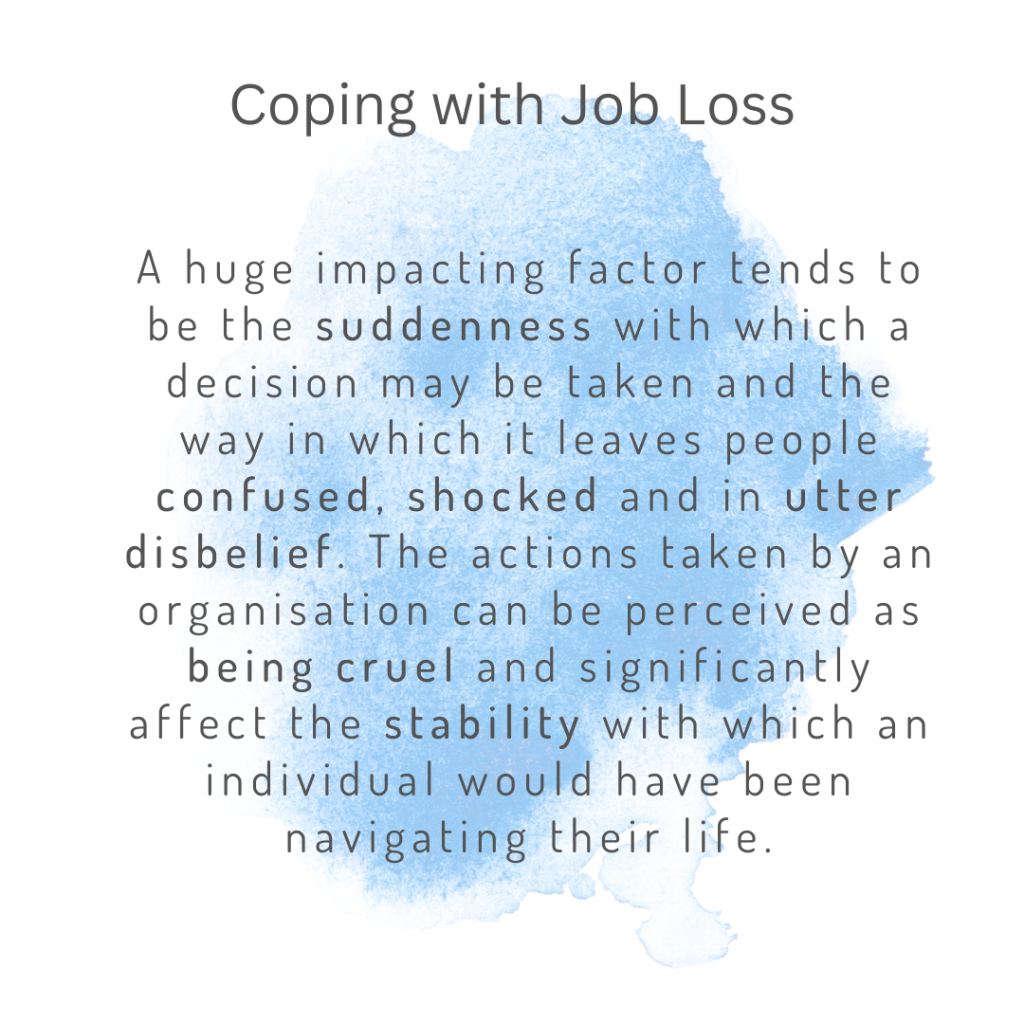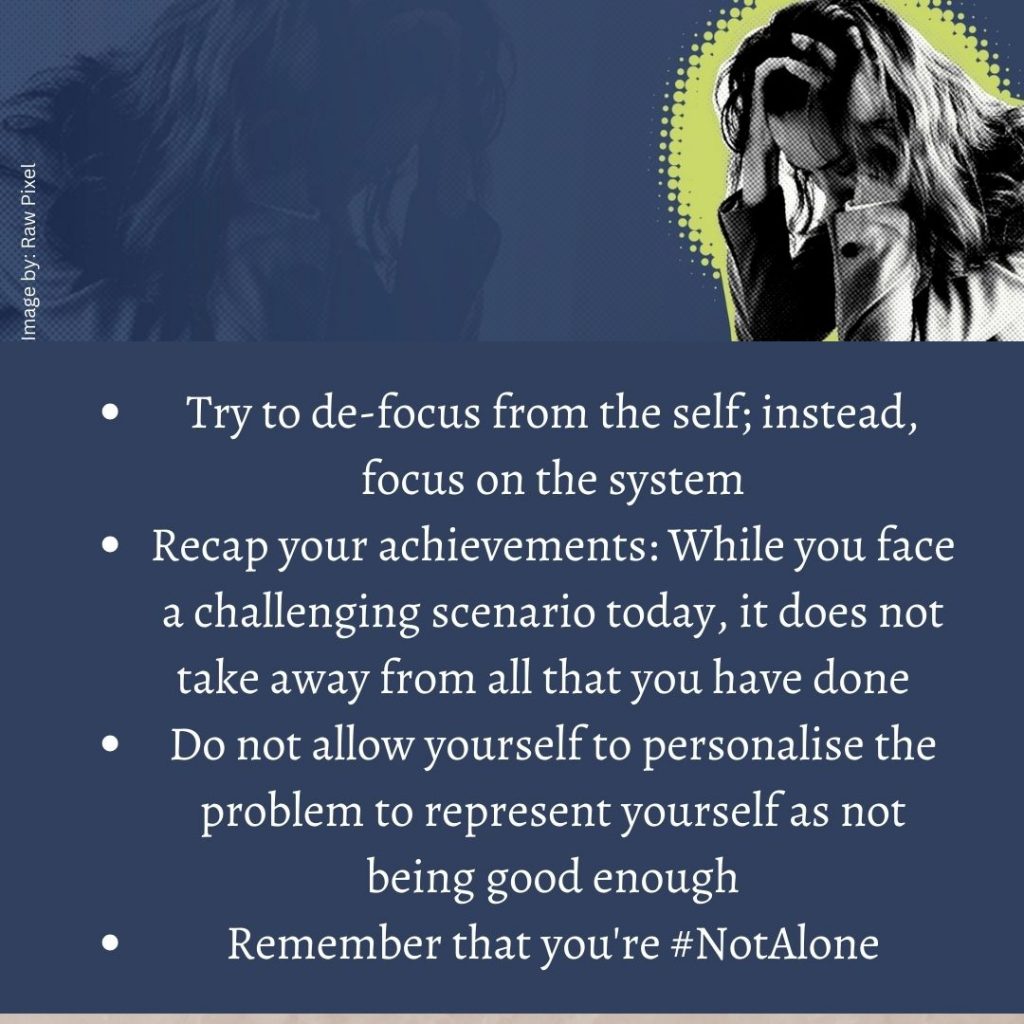Are There Ways to Cope with Sudden Job Loss?
By Kamna Chhibber
The current prevalent scenarios have led many to wonder about the security of their jobs and the certainty associated with the positions they hold at work. Many organisations have let go of employees recently, on account of multiple factors. While this is not the first time this is happening in our lifetimes, that doesn’t make it easier to deal with. During economic crises and periods of recession, the downsizing of the workforce across companies, retention of only essential functions, and even organisations being forced to shut down have an outsized impact on individuals and families, who experience significant challenges.

Facing job loss is an extremely challenging situation, and coping with it requires a multi-pronged approach which focuses on the self and the support of those around. Here are some things to keep in mind.
Multiple Impacting Factors:
The clear financial concerns apart, it is important to understand that the impact can be due to multiple factors. For example, a huge impacting factor tends to be the suddenness with which a decision may be taken and the way in which it leaves the person/people feeling confused, shocked and in utter disbelief. The actions taken by an organisation can be perceived as being cruel and they significantly affect the stability with which an individual would have been navigating their life. The fact that not everyone is let go of and that others may continue to work in similar positions leads to questioning of the self and can raise conjectures about what was wrong and why it was that a particular person or people were the ones to be let go of.
People can feel unsure about their skills and abilities and struggle to determine what the way forward would be. Not everyone finds it easy to go into a problem-solving stance and immediately start looking towards what the next steps are, even though one recognises that this has to be the approach.
Peers or co-workers who know the affected person realise the effect this is having on the person, and are also plagued with similar concerns around why it happened, what were the determining factors and how it was that they did not lose their own jobs. Some can experience significant guilt around the same, while others may also feel relief at not having to go through the situation. The struggle to help and support those who are going through the loss of their work can be hard and people are likely to feel that they need to push and find ways of being able to ensure that others are being taken care of.
This whole process of seeing mass layoffs which are affecting those who have been long-standing colleagues and friends can lead to a questioning of the ethos of the organisation and the way its systems are structured. This can become a larger issue over time, leading to psychological disengagement and disconnectedness with the system even for those who continue to be a part of the organisation.
Steps towards Well-Being
For an individual who finds themselves in such a scenario of having lost their job, the following are some aspects that they can focus on:
- De-focus from the self and focus on the system: Create a distance between the situation and your own self. Doing this is important because it needs to be reinforced that what one is going through is not about the individual and their abilities, but is rather reflective of a shift within the system. Whether this is on account of financial elements, restructuring of the organisation, change in policies or any other factors is what one needs to recognise and remember.
- Reinforce the strength of your abilities and achievements you have had in the past: Remember that there is much that you would have achieved all through the course of your work life. While you face a challenging scenario today, it does not take away from all that you have done in the past. Even if your role today is seen as redundant or one that is disposable given the prevailing conditions, it does not mean that you as a person are redundant or disposable.
- Do not allow yourself to personalise the problem to represent yourself as not being good enough. Isolate what has happened and link it to the system and you not being a good fit in current scenarios. But at the same time remember that the same you were a good fit and what is happening is on account of the transitions and macro factors.
- It’s Not You, It’s Them: Hold on to the reality that when mass layoffs are happening it is never about an individual and it is more about the structural and functional changes that are happening within the system. You can only take responsibility for your actions and commitment to the system you were a part of and not allow yourself to go into a negative spiral regarding what has happened and how you are a part of it.
- You’re Not Alone: Remember that in such a scenario there is great understanding and empathy that is evoked in those who are viewing things from both the inside and the outside. So don’t allow yourself to feel alone. There are people who would be there to support you and aid in figuring out the next steps.
- Connect with your support systems: Reach out and talk about the thoughts and feelings that are being evoked. Do not isolate and instead keep discussing the situations and the way in which you are envisaging to move forward with others around you so they can also make suggestions where needed.
- Take your time, then look forward: Take a problem-solving oriented approach and avoid over-analysing and reflecting too much in the direction of the past. While there is a lot to learn in this given situation, focusing on the way forward is more crucial at this point in time.

Providing Support (Do’s and Don’ts)
There are some cardinal aspects associated with providing support in such a situation if you are attempting to help or providing aid to someone facing this situation. Keep in mind the following:
- Avoid minimising the magnitude of the problem
- Redirect towards looking for solutions to the situation
- Help in mobilising resources towards finding more avenues for work
- Aid in doing the practical aspects of what needs to be taken care of
- Enable the expression of thoughts and feelings
- Do not indicate that you fully understand what the stress and pressure of the current situation is like
- Allow the person to be able to come to you as and when they need to. Do not overcrowd them
- Remind them of your availability and share that they can reach out whenever they would like to
Reaching out for help and aid is an essential and something that a person facing such a situation should not hesitate to do. At the same time, it is important to look at this situation as one that would also change and pass. It involves a large transition, however, it is a transition and looking at it as such allows one to cope more effectively.
Banner image by Raw Pixel



